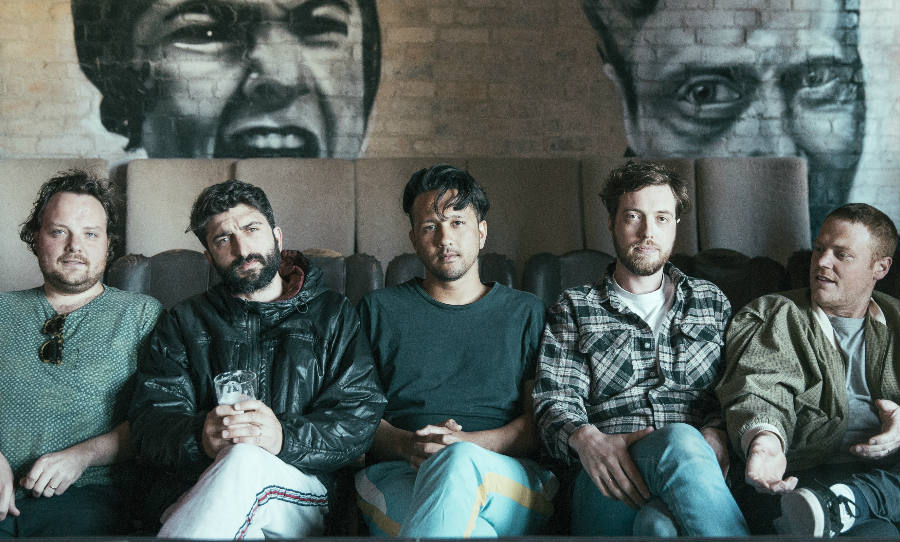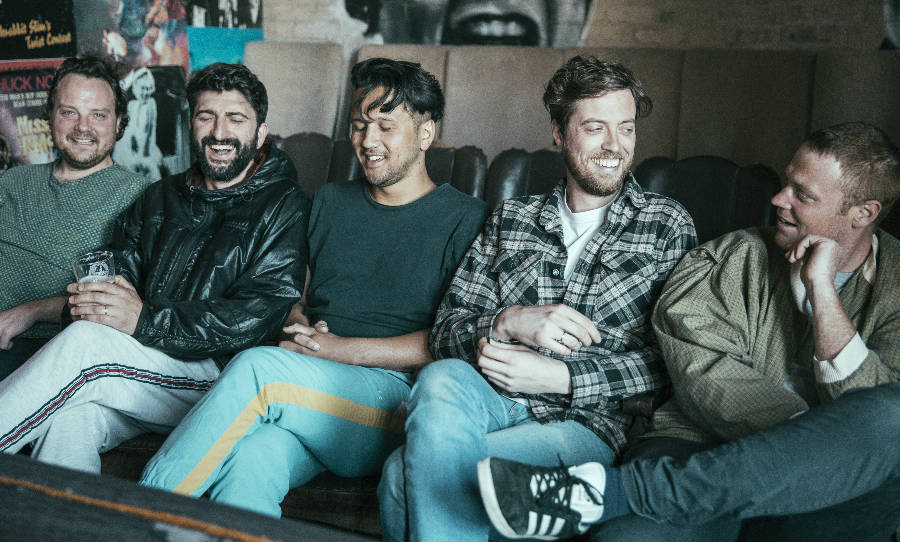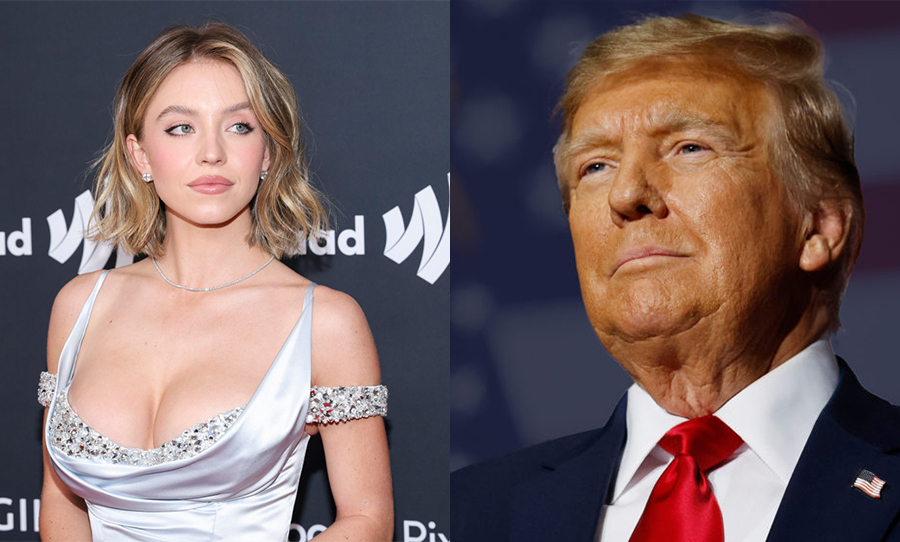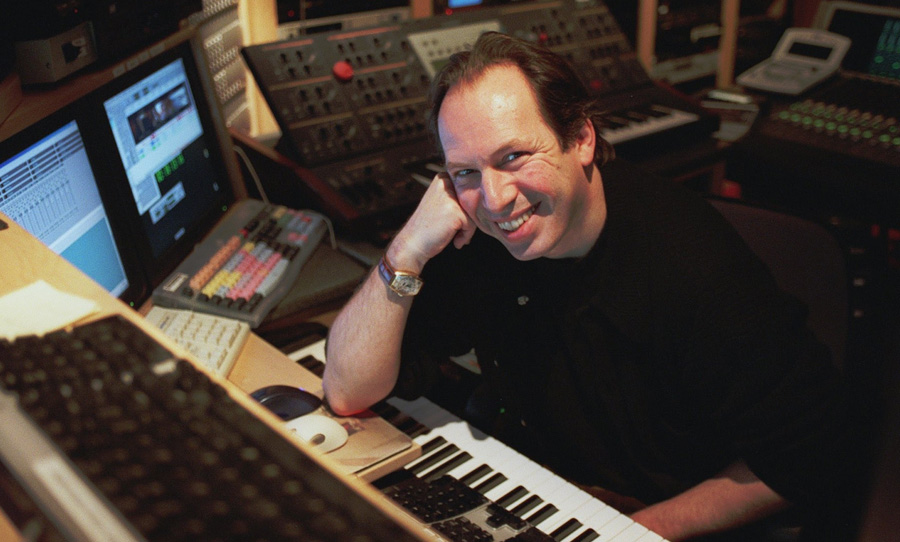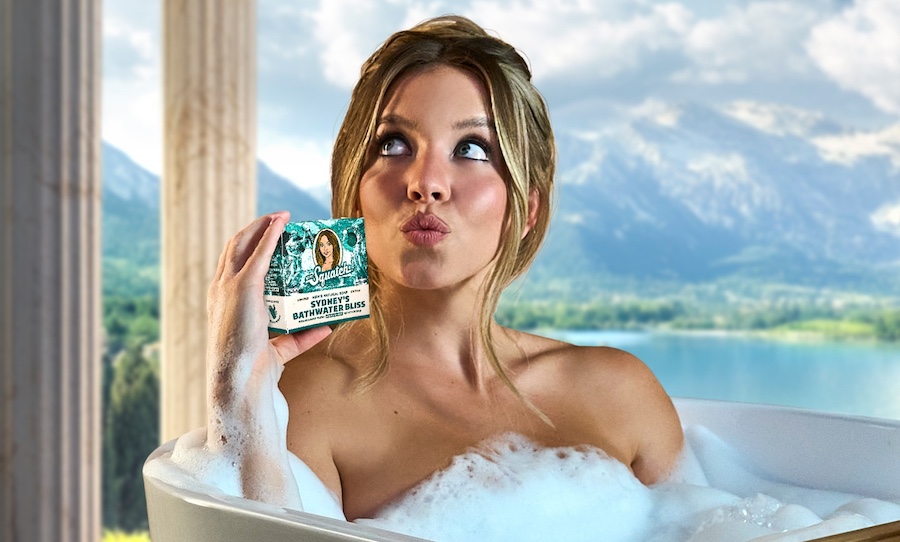Total Giovanni are a band like no other. Throughout 2014 and 15, the quintet released a string of singles, performed an iconic set at Golden Plains Festival, and sold out four (maybe five) consecutive shows at Melbourne’s Gasometer Hotel. Then, right as things looked to be taking off, they embarked on a multi-year hiatus from releasing music.
Why? Well, they had begun work on their debut album… and as has been a running theme throughout their career, they wanted it to be done on their own terms. So now, in 2018, we have finally been gifted Euphoria; the debut full-length release from Total Giovanni.
Before they performed at Sydney’s Oxford Art Factory in support of the album, we caught up with the band to chat about the making of Euphoria, breaking down barriers of Australian masculinity, and making pop music in a DIY way.
“There’s nothing manufactured about this. It’s just five people who have known each other for a long time who are having a lot of fun“: Total Giovanni chat their debut album, Australian masculinity, and making pop music in a DIY way.
HAPPY: Going back to 2014 and 2015… you released a string of great singles, you performed that iconic set at Golden Plains, you did four sold-out shows at The Gasometer…
JULES: I think it was five. I sound like a wanker… disregard that.
HAPPY: Then after all this, you went on hiatus…
VACHEL: We actually became Hiatus Kaiyote, which no one knows.
HAPPY: Taking a hiatus at this time, when everything was really picking up – it seems like a strange move…
MATTHEW: Yeah it was a really shit idea.
HAPPY: So the first question is, why do that?
VACHEL: We didn’t have the capacity to keep going. We all started having babies, and we had burnt out a bit. We all wanted to go back to the drawing board and write a good album, and I don’t think we would have been able to do that if we’d tried to punch out an album in six months. Taking the non-Richard Branson approach to growth has been a more sustainable approach for us. I think that’s why the album has got more interesting elements to it. Because it kind of slow cooked for a couple of years.
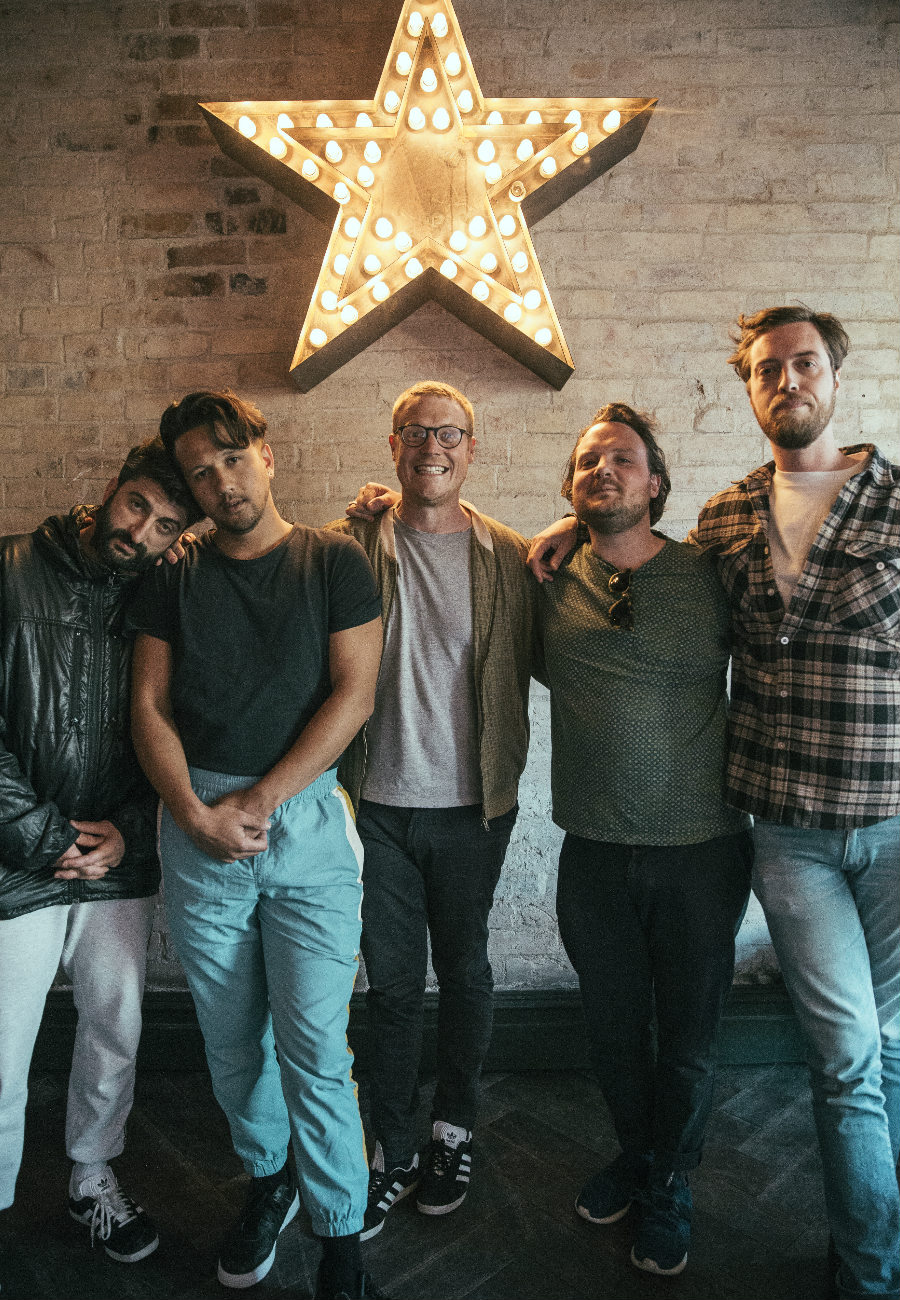
MATTHEW: Also, a lot of the kernels for those songs came out of a weekend we took away not that long after we took that hiatus. A lot of those songs on the record, like the nucleus of those songs, and the nucleus of what the album would be, were created not that long after those Gaso shows. It was also an internal process. We definitely went in on ourselves.
VACHEL: And for a long time, we didn’t know how it would pop out on the other end. Because we got so deep in the production, and a lot of that stuff was really slow going. But it’s really nice to have finally popped out the other end like “nice, we did it.”
JOE: We’re as surprised as anyone else that the album is finally done. But I think also – we were saying this just before – we made the decision to do a lot of this internally. That whole process was done by the band. All the way from those first ideas to the thousands of hours of mixing that Horse and Matt did… that’s a long process. But we were committed to doing that as a band…
VACHEL: To try and make a big pop record in a DIY way. Doing it in Horse’s bedroom, then in Horse’s studio, and doing all the mixing and production ourselves added a degree of difficulty to it. When you don’t have the finance to be able to work on it full-time, you’ve got to just chip away. I lived on the same street as Horse for a while, and I’d just pop over for a few hours. So we had to just chip away at it slowly while having day jobs and families. We couldn’t just be like “yeah, let’s take six months off life and make an album in the Bahamas” …which we still want to do at some point. We need finance though.
JOE: Just don’t tell my wife…
MATTHEW: Bring the wife!
HAPPY: You mentioned the album was written over a weekend away…
JOE: The kernels…
MATTHEW: Saying it was “written” is a bit hectic. We started with a riff that we liked…
JULES: Then we stripped it back and built it up again.
MATTHEW: We re-wrote it and re-wrote it.
JOE: But we did go back and listen to those kernels…
VACHEL: The nuclei for most of the songs emerged from our jamming, and from a multi-lateral improvisational process. But from there to the finished product takes a lot of crafting and baking.
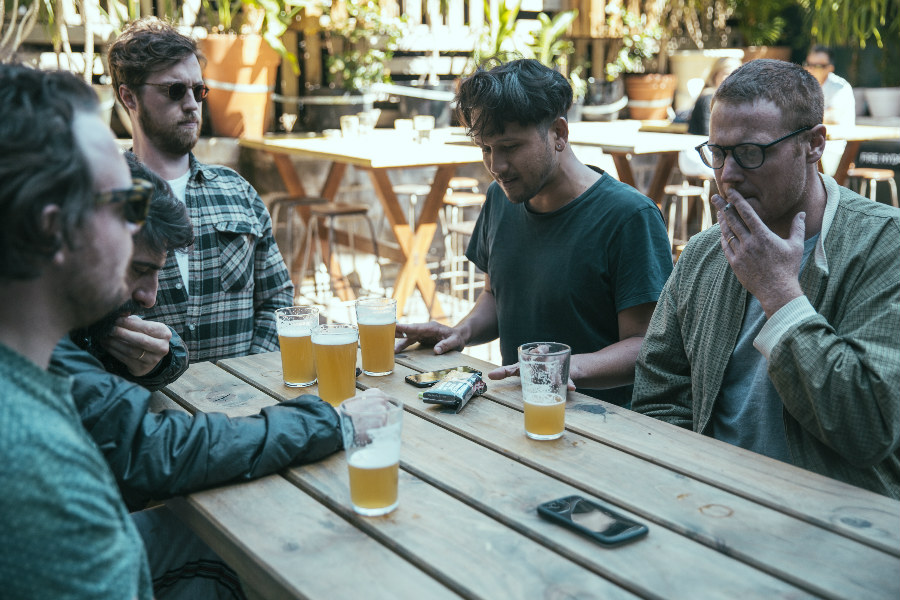
(NOTE: Throughout the entire interview thus far, Horse has been giving Jules a very sensual massage)
JULES: A little side note… Horse must be half Thai because I feel so much better.
DAVE: My nickname is Horse, by the way.
HAPPY: I can’t wait to add a little note in the article about this massage…
VACHEL: “Horse has been giving Jules a massage for the first half of the interview.”
HAPPY: When you’ve been writing these songs, have you always been steadily chipping away? Or have there been points where you’ve left the songs for a while and come back to them later?
VACHEL: There have been peaks and troughs of activity. There have been periods where we’ve been able to put a lot more in, and periods where it’s slowed right down to a trickle, just because there was stuff going on. So it wasn’t without its frustration and hardship. But we were always stubbornly committed to finishing the album the way we wanted to finish it. Some of the songs went through so many different phases to get to where we wanted them to be.
JULES: On the other side of that, there are a couple of tracks on the album that didn’t really take long at all. So amongst all that deliberation and chipping away, others came off on a whim basically. Songs we didn’t know we were going to turn into a song. We sort of just acted on a moment. So that’s actually been a nice counterbalance.
JOE: Some are the product of a collective, like those jam sessions. And then others, like Akila – which I think is what Jules is talking about – came really quickly to the table.
VACHEL: The songs all had different processes creatively. Akila, Awake, and Better all came in a more short, spontaneous way. Whereas Comes In Waves took hours and hours of tinkering.
MATTHEW: We’ve been playing Comes In Waves for three or four years…
JULES: It’s funny playing certain songs on the album that aren’t technically new songs. We’ve been playing them live for a long time, we just didn’t happen to get those up as quick. Effectively, they’ve been done for a while. You work on songs for so long, and internally as a band, you might actually get sick of it. Then you release it, and people are hearing it for the first time…
VACHEL: And that kind of breathes new life into the songs…
JULES: Yeah playing them live certainly does.
JOE: With When We Break, I find it really bizarre how now we’re hearing the crowd sing that back. It came out of nowhere.
VACHEL: Certain songs percolate in different ways with different people, which is always interesting.
HAPPY: You hear about a lot of bands who are writing music quicker than they’re releasing it, and they struggle to sit on their current release…
VACHEL: Yeah, you’ve got to learn to be patient. I was thinking about someone like Bruce Springsteen, who’s played his hits thousands of times, and he still has the generosity of spirit to come out in front ten-thousand people and sing Dancing In The Dark. He must be like “I fucking hate this song.” But what a legend. And I think there’s a certain degree of professionalism that, if you’re going to be a live musician, you have to understand. When people come to see you live, they might be coming for the first time. It’s about making it a nice time for them.
JOE: I don’t think I’ve ever heard the term “professional musician” said in the context of Total Giovanni.
MATTHEW: Because of completely uncontrollable circumstances, we took this thing that started as a joke and a laugh – I mean, we always cared about it. Like any band when you first start, you hope it does something… but you don’t really know what that is. Total Giovanni kind of got these legs of its own and took off. It got to a point where we were like “holy shit, we just did Golden Plains,” and it was this massive show, and then the Gaso shows… it created this mythology around it, that I don’t think we ever could’ve anticipated. Because you’d have to be crazy to think you’d ever get that kind of reaction so early on. So it kind of got out of our hands really early, and we had to try and pair it back. We had to regain control of this beast. This is such a different approach to any other band I’ve been in. I was in other bands that plodded along and didn’t do anything for years. We always had new songs, but no one was ever really listening.
VACHEL: It changes the dynamic a little bit when you’ve got an audience all of a sudden.
JOE: And that happened really quickly.
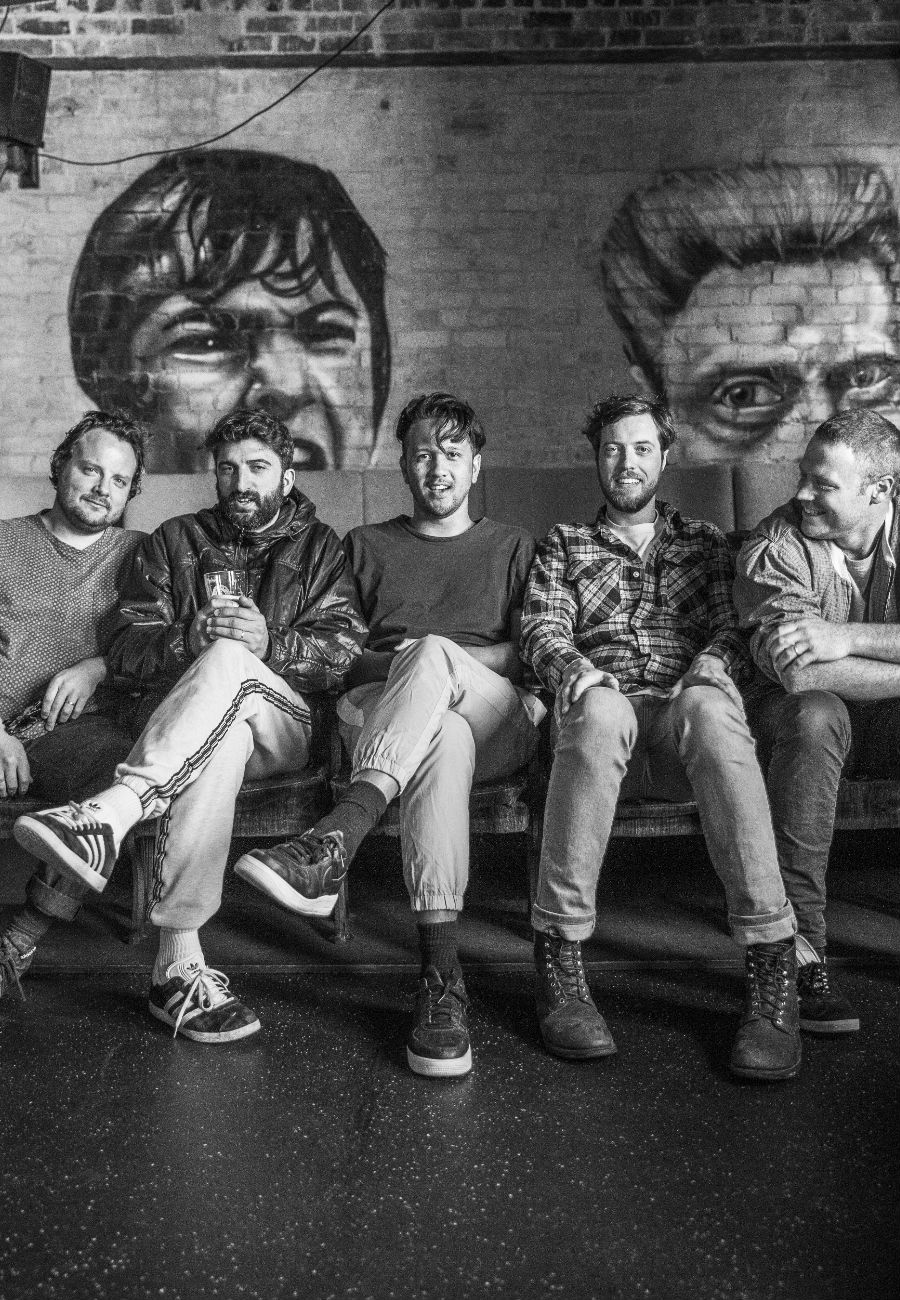
HAPPY: It is interesting going back to when you first started… because while your music is very danceable and fun, it’s also laced with a lot of social commentary…
MATTHEW: Horse, myself, and Joe had all been in guitar-y bands in Melbourne that just played pub shows and stuff… and it was that real dolewave-y thing happening in Melbourne, that for me especially, I really wanted to do something completely different. Something where we had costumes and drum machines. It was a real reaction against that scene, to do something really out of the box. The only thing I wanted to do with the band when it started was to actually do a show, instead of just stand there and strum away, shoegazing. So that was the initial inspiration for me.
JOE: And you were just saying that there’s a dichotomy between the fun of the music and emotion of that record… that’s something that I love in dance music. I love dance music, and I love it when there’s that tension between the music and very personal, emotional lyrics.
VACHEL: And it can be all the things, hopefully. Joe and I were just playing a song on FBi, and we were talking about the lyrics, and Joe said: “oh, I’ve never actually listened to the lyrics.” And you can appreciate a dance song without listening to the lyrics, and I think it’s good that it has those levels. It’s a song that’s good to dance to, but then once you’ve heard it a thousand times, you’re like “oh fuck.”
MATTHEW: Walking On The Sun by Smash Mouth. I never knew that was about drugs until the other day. I remember that song from when I was a teenager, and the other day they were playing it on the radio, and I was like “holy shit, this song’s about crystal meth.”
VACHEL: It’s also like What A Fool Believes. It sounds like super cheesy yacht-rock, but it’s actually a tragic song about unrequited love and being a fool. So on the outside, it’s this stupid song that everyone dances to like an idiot, but it’s actually heartbreaking. So I hope that sometimes, that might be something that comes through our music.
JOE: I’ve been thinking, and I think that When We Break resonates with people like that. The production’s wonderful, but I think lyrically there’s a lot that resonates. Which is the hope with the album as well.
HAPPY: There are different levels of accessing the one piece of music…
JOE: Yeah!
VACHEL: Hopefully, yeah.
HAPPY: Masculinity seems to be one of your biggest targets… and this may be reading too far into things, but in your videos for Can’t Control My Love and Awake, you use these old-school televisions as an escape from two respective masculine worlds…
VACHEL: Yeah…
HAPPY: Was that intentional?
VACHEL: Yeah I’ve thought about this too, after the fact. Because they both had different production teams, but the idea was something that came from collaboratively with the director. So I definitely think those are themes. I think Australian ideas of masculinity are very boxed in. You know, straight men can’t be expressive or sensual…
JOE: Or joyful…
VACHEL: Yeah exactly. So I think we like the idea of exploring that in a playful way. As you said, the TV’s a portal. It’s a portal and a way to explore how things could be different if you were just a little more expressive, and not so boxed in by social norms. I think that’s why the live shows went so well. Because we, as a bunch of friends, have always enjoyed playing together… you know, that’s how we are when we’re rehearsing and stuff.
JOE: Or at kick-ons. We spent a lot of time in our twenties hanging out with each other.
VACHEL: And that silly energy of “let’s put a salad bowl on our heads and dance around,” it comes from that fun time. So when that was also present in the live show, I think people got a kick out of that. Because it’s very universal. I think everyone can identify with that sense of play. But certainly, I think certain people may not feel as free to access that. For example, Australians don’t dance very much – especially Australian men. So there are some of those barriers. But when people come to the gig, I think they feel free to dance because they don’t look as stupid as the people on stage.
JOE: Yeah definitely. And I know this process has taken a long time, but what that time has allowed for, is that when we do come together and play live, it is a truly joyful experience for us. There is nothing manufactured about what we’re having on stage. I’m looking over at Dave, and there are moments of genuine joy where we’re fucking around with each other… or literally any moment where Jules is doing anything on stage…
VACHEL: Jules loves to fuck shit up on stage… it’s like “oh, Jules is gyrating on my leg… this is cool.”
JOE: But there’s nothing manufactured about this. You could look at it and think “this is a show that’s been carefully conceived,” but it’s not. It’s just five people who have known each other for a long time who are having a lot of fun.
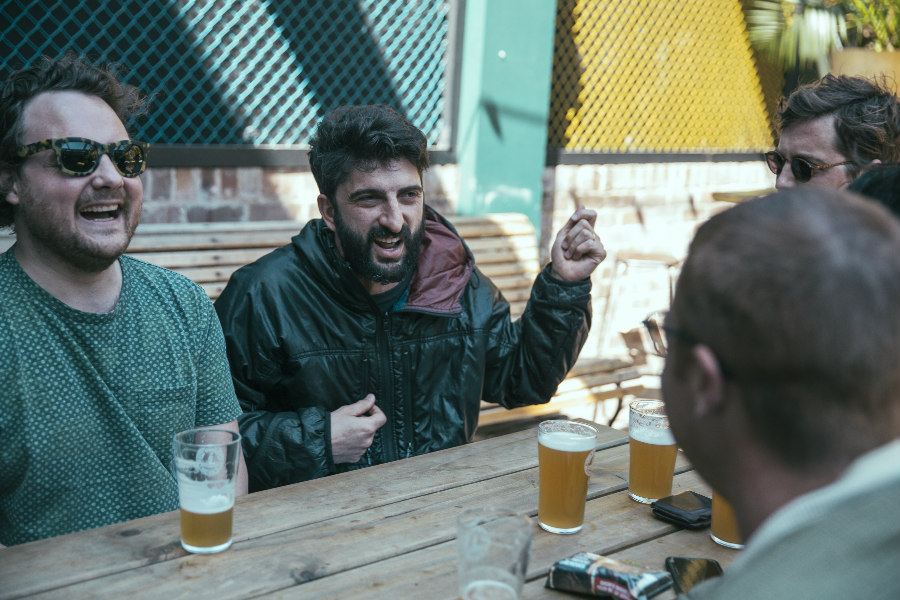
HAPPY: You mentioned that in Australia, blokes don’t really dance. Did you ever find it difficult breaking through that?
MATTHEW: Well it kind of happened for us.
VACHEL: I grew up dancing, and I didn’t tell anyone. I kept that a secret until I was like fifteen. I also played footy and did all these other things that were more okay… but I couldn’t talk about dance because it was like a taboo. I felt like I would get teased about that… and I think that’s really common. Even talking to Jules’ baby mama about their son who does dancing… as an Australian boy, you cop a huge amount of shit if you’re like “yeah, I like dancing.” That impunes on your sexual preference, in a stupid way. We have all these assumptions we make about what men can and can’t do, whereas if you go to another culture, men dance in the street. It’s not a big deal. Men dance with each other, or men hold hands – it carries no imputation about your sexual orientation. It’s a freedom and a way of being. So at a personal level, we’ve all bumped up against that. But that was never necessarily an intentional thing for the band.
JOE: No, and it’s just an extension of who we are. As I said, we’ve all spent a lot of time dancing with one another through our twenties. That element doesn’t feel like we’re pushing up against anything, because it’s just who we are. The live show is an expression of we are.
Euphoria is available now.
